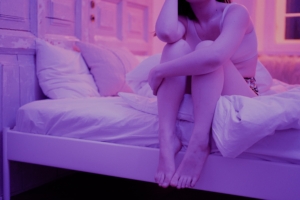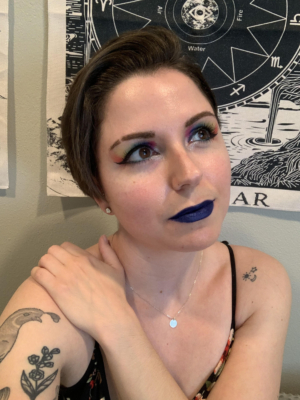What a Year of Sobriety Has Taught Me

I’m lounging on my sectional, thumb hovering over the “Deliver” button in Uber Eats. I have Feel Good on the TV, a Netflix original about a queer girl with a drug addiction that she considers past tense. I just texted a friend asking if it was too risky to get cake delivered to me. I’ve been sheltering in place for a while at this point, and I haven’t had dessert in ages. Before quarantine, I considered cutting sugar out of my diet to see if it would ease my anxiety. Since I’ve been alone, I’ve done a lot of back-pedaling and calling it “self-care.”
Today is March 24, 2020: My one-year anniversary of being sober. It’s nine o’clock at night and I’m just now realizing I never thought I would make it this far. My sobriety feels so surreal that I’m constantly having dreams about cheating on it and disappointing myself. I used to have dreams like that when I was in serious relationships too; I’d cheat on them and have to confess. I never got to experience the “fun” parts of those dreams — the drinking, getting high, the sex. Just the consequences.
Anyway, a whole year of anything feels like it deserves recognition.
Well, that settles it, I text my friend. I’m buying the cake.
Feel Good is easy to blast through at 25 minutes an episode. It’s a dramedy, situationally funny with dark undertones. But the more I watch, the more my chest tightens. I recognize all these characters — not the actors, but the roles they’re playing.
I’m new to delivery apps so I accidentally buy two cakes, and yes, I eat both. The texture is moist with soft cranberries and crispy walnuts mixed in. There’s entirely too much icing, but it’s so creamy, just a hint of sweetness among the cream cheese, caramelized sugar dusting the top layer, that I eat it all anyway, dipping my fork in for more and letting it make my tongue raw.
A specific scene in the Feel Good finale stays with me long after the credits roll. One character relapses with a member of her NA group, a guy who represents everything she hates. She’s at his house when they run out of coke, and there’s this moment when panic widens her eyes: She knows she’ll come down soon. She turns to the guy and just says, “Do you want to have sex?”
The tightness in my chest spreads to a sickness in my gut, a sadness that washes over me like a fog. Not even the carrot cake can dull it. Earlier in the episode, she told the guy she wasn’t interested in sleeping with him. I know she never would have done this if she were sober.
I just binged the entire season and now I’m stewing in shame — like I stayed up drinking instead of watching TV and eating cake. Like I’m the one who propositioned a man I would never love into sleeping with me. To risk his rejection. To feel adrenaline pulse where his fingers touched me, to feel more in my body than in my head, for once. To have him grab my wrists and make me feel small.
That’s just what happens in the show. It’s not real. I didn’t do that. I didn’t.
But I have before.
***
About a week before social-distancing mandates shut down the country, I went to San Antonio for a writing conference. Most of the seminars I wanted to attend were canceled because the authors were proactively staying home. I had a lot of time to kill, so I stayed at my Airbnb working on the second draft of an article my editor didn’t like. I felt restless. Antsy. Before I became even “sober curious,” I’d quell this feeling by getting high, drinking, or sneaking into abandoned buildings alone at night. The trouble is: I crossed all these off my list of coping mechanisms, but I don’t know any healthier alternatives. Meditation pisses me off. Yoga doesn’t slow my heart rate. My antidepressants help, but they don’t get me high — and that’s the point.
I decided on a whim to get a tattoo, a line from an E. E. Cummings poem: “Nobody, not even the rain, has such small hands.” After paying, a boy in the waiting room stops me to ask about the writing conference I’m in town for. He was reading a book, an actual work of fiction. He told me he’s a writer too. I liked the way his sad eyes looked into mine. We both knew I’d leave in a few days and that this couldn’t turn into anything, and it’s maybe because of that that I asked if he’d go out with me that night.
Later, as he takes sips from a Lone Star and drags from a cigarette, I nurse a Dr. Pepper and explain myself: Alcoholism is in my blood. But I caught it in time before anything really bad happened. I told him I wasn’t an alcoholic and that I was sober by choice.
I tell him: “I just didn’t like how much I liked drinking.” I didn’t tell him that I’d lose track of my drinks. How alcohol, even at its sweetest, never tasted good to me; I always gulped down the drinks until I couldn’t feel my face anymore, until I had intimate conversations with strangers. I didn’t tell him that I almost always drank until I threw up, then wallowed in bed the next day feeling sick and ashamed, wondering what I did the night before to make a fool of myself. I didn’t tell him about puking in my purse, driving drunk and wondering how much it would hurt if I turned into oncoming traffic, sleeping on my side so I wouldn’t choke in my sleep.
I did tell him that I’d been reflecting a lot on my sobriety with my one-year anniversary looming. It helped me discover other places where I was hiding from myself: I celebrate by eating sugar. I numb myself with TV. I shop when I’m sad. Things like that.
I was more open with him than I normally would be on a first date, thinking about how he’d take this information, how he’d interpret me. Daring him to reject me, to show me I was just as undesirable and worthless as I felt.
I invited him back to my Airbnb, with no pretense that we would enjoy a few drinks there.
We didn’t have to sleep together. He might have pushed it, but he didn’t. I’m the one who initiated that conversation, letting myself disappear into the present for once. I just wanted him to make me feel full.
***
Although my encounter was unlike that scene on Feel Good, I can’t keep myself from thinking about it now: the chase, the rush, the awareness of an ending that kept me in the moment. The shame that found me in the car on the drive home. The voice in my head that said, “Where’s your sense of self-preservation, Amanda? He could have hurt you.”
He didn’t. But people had before.
I hadn’t even been drinking. I couldn’t blame my recklessness on that.
But being with Mr. San Antonio — binging him through the weekend — felt like getting drunk. I felt exactly the same feelings of worthlessness after I got home as I did after a night of drinking.
Sitting in bed after turning off the TV, the lingering ache of Feel Good rattling around in my ribcage, I’m thinking, It feels impossible that I’ve been sober for a year.
In a way, I haven’t been completely sober. I stopped drinking and I stopped doing drugs, but I’ve continued to chase highs in other places.
I’ve been fooling myself into thinking that I wasn’t an addict because I didn’t have to go to rehab. I haven’t relapsed. Drinking didn’t interfere with my daily life before I became sober — not in the way it did for people on TV.
But today is my one-year anniversary since I quit drinking and doing drugs, and I’m crying because I don’t want to be sober.
Not because I feel like I’m missing out with my friends or because, culturally, I don’t know how to celebrate or mourn something without drinking.
I don’t want to be sober because I don’t want to be here. I want to escape. I want that glorious 30 minutes where you’re getting drunk — but you’re not drunk yet — but you’re too buzzed to realize you should stop drinking, and everything is perfect. And the truth is, I’ve wanted to escape from my life at least weekly since I quit drinking. The craving is in me like an itch under the skin, deep in the muscle.
If it weren’t for the immense support of my friends — if just one person had said, “It’s no big deal, just have one drink” — I never would have lasted this long.
Now, in quarantine, I think, No one would judge me if I started drinking again. Everyone would understand. Everyone is already posting on Instagram and Twitter about having champagne for breakfast, that the days are just separated by coffee and wine.
I’d blend right in.
And it’s this thought that finally makes me admit to myself that I’m an alcoholic. I’m not the kind of person who can have a glass of wine with dinner and stop. There’s something lurking deep inside me, something that wants to put me in harm’s way. After a year of sobriety, I am only now beginning to question: Why can’t I be alone with myself?
Amanda Woodard is an MFA candidate at Antioch University and a freelance copywriter at mediamanda.com. Her work has been performed in Oral Fixation and published in Ten Spurs, Keep This Bag Away from Children and FlashFlood. When she’s not reading and writing, she enjoys playing board games, rock climbing and practicing yoga.





